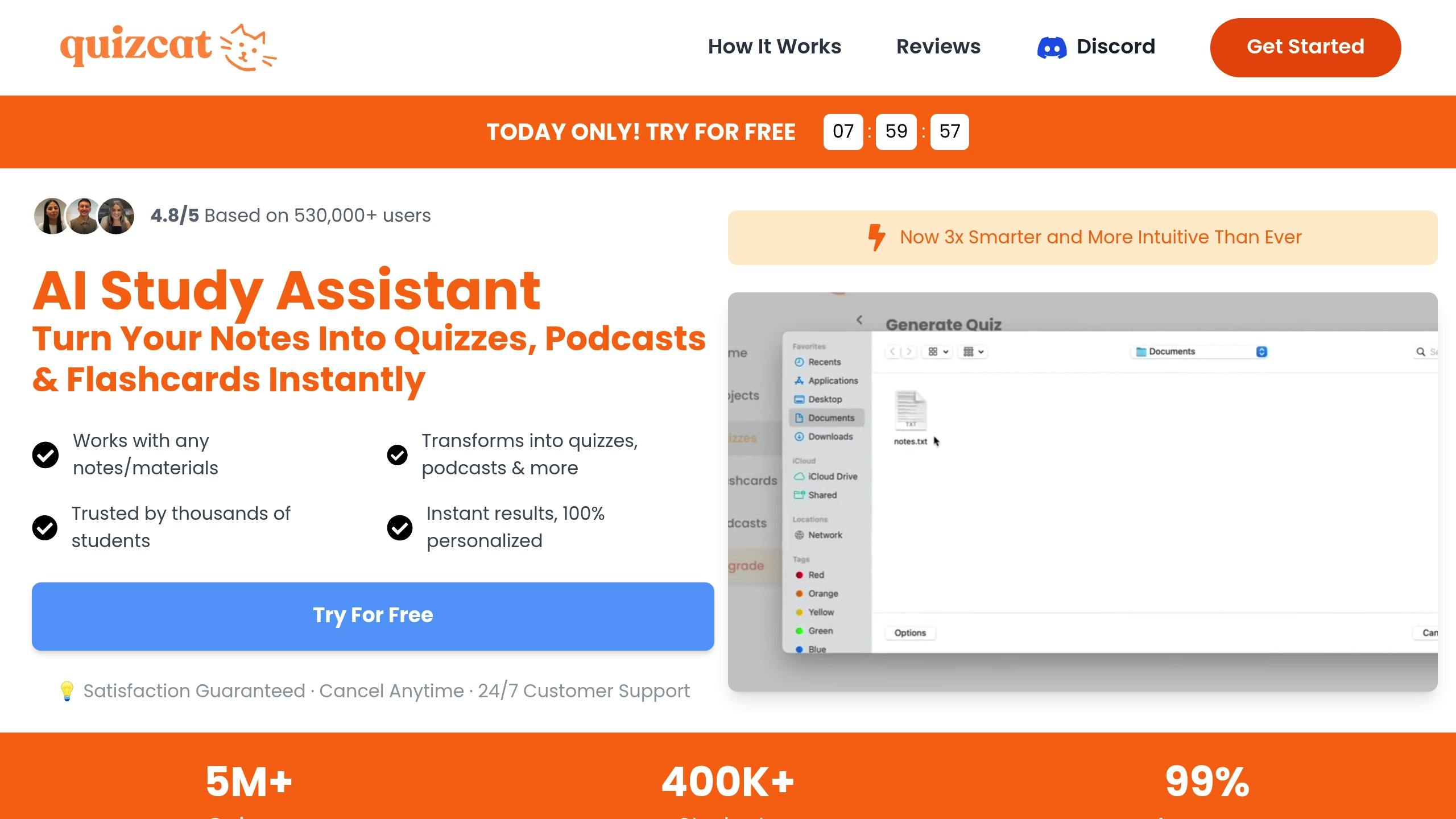
AI Math Feedback for Exam Prep
AI math tools can help you prepare for exams more effectively by identifying your weak areas, providing instant feedback, and creating tailored practice sessions. Students using these tools report scoring 20% higher and mastering concepts 30% faster. Here's how these tools work and why they’re useful:
- Error Detection: Pinpoint mistakes in problem-solving and offer step-by-step corrections.
- Custom Practice: Generate exercises based on your specific needs and progress.
- Time Management: Save time by focusing on weak areas and adjusting difficulty dynamically.
Popular platforms like QuizCat AI, Photomath, and ALEKS offer features like interactive quizzes, visual aids, and personalized learning paths. For example, QuizCat AI combines quizzes, flashcards, and podcasts to make math prep easier and more engaging. Whether you need detailed explanations or adaptive practice, these tools can complement your study routine effectively.
Quick Tip: Integrate AI tools into your daily schedule by starting with diagnostics, practicing weak areas, and reviewing progress regularly. This balanced approach can boost confidence and improve results.
Writing and Math Feedback with AI Tools
Understanding AI Math Feedback Systems
AI math feedback systems evaluate student work using tools like pattern recognition, natural language processing, and machine learning. These technologies make it possible to create personalized exam prep strategies, as mentioned earlier. By comparing student solutions to databases of correct answers and common mistakes, these systems can pinpoint both procedural errors and conceptual misunderstandings [5][6].
Error Detection and Fixes
Advanced platforms like Carnegie Learning's MATHia go beyond simply marking answers as right or wrong. They analyze how students approach problems to better understand their reasoning [1]. Common errors identified include:
- Misusing mathematical formulas
- Gaps in logical reasoning
- Mistakes in step-by-step calculations
For example, Photomath doesn't just solve equations - it also provides detailed explanations and multiple solution methods [2]. When errors are detected, these systems offer instant feedback using visual aids and step-by-step breakdowns tailored to the student's comprehension level. This immediate guidance lays the groundwork for AI-driven practice sessions, which are discussed in the next section.
Custom Practice Problems
AI tools create focused practice sessions by analyzing patterns in mistakes and pulling from categorized problem banks [9]. The process typically involves three main steps:
- Analysis: Identifying recurring errors and gaps in understanding
- Response: Generating exercises tailored to the student’s needs and adjusting difficulty
- Outcome: Reinforcing concepts to strengthen weak areas
These systems provide real-time feedback as students work through problems, ensuring exercises are tailored to their learning style and specific challenges. This approach helps students prepare for exams by concentrating on areas where they need the most improvement.
AI Tools in Math Exam Prep
AI-powered tools are changing how students prepare for math exams, making study sessions more personalized and efficient. These tools not only catch errors immediately but also explain the math concepts behind them, helping students gain a stronger grasp of the material.
Direct Feedback for Better Understanding
AI feedback systems shine when it comes to giving precise, immediate responses. Instead of just flagging wrong answers, they guide students through the problem-solving steps and pinpoint where they made mistakes.
This method gets results: 78% of educators have noticed improved comprehension among students using AI tools [7].
Smarter Study Time Management
Students using AI tools finish homework 27% faster while maintaining or improving their performance [8]. This is thanks to smarter time management, driven by performance data.
Here’s how AI tools help streamline study time:
- Identify recurring mistakes to focus on weaker areas
- Adjust practice levels to match upcoming exam schedules
- Shift focus dynamically based on progress and results
These features make platforms like QuizCat AI stand out, offering an adaptive learning interface that puts these strategies into action.
QuizCat AI for Math Practice

QuizCat AI uses real-time feedback to help students prepare for math exams, offering features that make learning more engaging. Its AI-driven system creates personalized study paths to help students grasp mathematical concepts effectively.
The platform focuses on three main tools to enhance learning:
| Tool | Function | Key Features |
|---|---|---|
| Interactive Quizzes | Tests understanding and retention | Instant feedback, adjustable difficulty |
| Smart Flashcards | Quick formula and concept review | Spaced repetition, visual aids |
| Math Podcasts | Audio explanations for learning on the go | Convenient learning, concept breakdown |
This blend of tools supports studies showing that using various formats improves math retention [4].
The quiz system stands out by tailoring questions to individual needs, analyzing errors, and adjusting difficulty based on performance. This ensures students get the right level of challenge while reinforcing their understanding.
Getting Started with QuizCat AI
Using QuizCat AI is simple:
- Upload Your Materials: Add your notes, textbooks, or study guides to the platform.
- Choose Study Format: Pick from quizzes, flashcards, or podcasts based on how you like to learn.
- Set Focus Areas: Define the topics or skills you want to concentrate on.
For the best results, mix and match the tools. Use flashcards to memorize formulas, and listen to podcast lessons during downtime like commutes or workouts. Podcasts are especially helpful for breaking down complex math ideas, making them easier to understand [4].
sbb-itb-1e479da
AI Math Tool Options
Platforms like QuizCat AI offer a range of learning formats, but other tools take different approaches to support math learning. Research backs their effectiveness - one 2023 study found students using AI math tools scored 15% higher on average compared to those relying on traditional methods[9].
Here are some popular AI math tools for exam preparation:
| Tool | Focus | Key Features | Price |
|---|---|---|---|
| Wolfram Alpha | Computation | Advanced problem-solving, step-by-step solutions | $5.49 |
| PhotoMath | Visual Learning | Camera-based problem recognition, detailed explanations | $9.99 |
| ALEKS | Personalized Learning | Adaptive content paths, knowledge assessments | $19.95 |
Math Tool Comparison
Wolfram Alpha is ideal for tackling complex calculations. While it doesn’t emphasize feedback, its powerful analysis engine is great for verifying advanced problems.
PhotoMath excels in visual learning. By recognizing problems through a camera and breaking down solutions step-by-step, it helps students grasp the reasoning behind each answer.
ALEKS stands out for its adaptive learning approach. It adjusts content difficulty in real time, creating a personalized study experience. Studies suggest this method can help students achieve the same results in 30% less time[11].
Choosing the Right Tool
When picking a math tool, think about:
- Your exam’s math level and requirements
- Your preferred learning style (e.g., visual or hands-on)
- Your budget
The key is matching the tool to your study needs and goals.
Getting the Most from AI Feedback
To make the most of the tools mentioned earlier, students need a clear and organized plan. Studies show that combining AI feedback systems with traditional study methods leads to better outcomes.
Adding AI to Study Plans
Incorporate AI into your routine by blending its analytical strengths with personal effort:
| Time | Activity |
|---|---|
| 30 min | AI Diagnostics: Use QuizCat AI to pinpoint weak areas |
| 45 min | Targeted Practice: Work on problem areas guided by AI |
| 30 min | Manual Work: Solve problems independently to solidify concepts |
| 15 min | Feedback Review: Evaluate progress and adjust your focus |
Dr. Emily Chen from UC Berkeley highlights the importance of consistency:
"Students who maintained regular AI practice sessions showed significantly better retention and understanding compared to those who used AI tools sporadically" [7].
Balancing AI and Manual Practice
Here’s how to structure your day for maximum benefit:
- Morning: Start with AI-guided practice using QuizCat AI diagnostics.
- Afternoon: Work on applying concepts manually without AI assistance.
- Evening: Review your progress using platform analytics.
Tracking your improvement through platform analytics can boost your confidence significantly. In fact, students who monitor their progress report a 78% increase in confidence when tackling math problems [6]. This balanced approach lays the groundwork for the final exam review methods discussed next.
Summary
This guide has shown how AI-powered math feedback systems can transform exam preparation by offering personalized learning and instant corrections. When paired with traditional study methods, these tools can significantly enhance the learning experience.
Key strategies for effective use include:
- Pinpointing weak areas with diagnostic tools
- Practicing using tailored problem sets
- Monitoring progress with detailed analytics
- Strengthening understanding through diverse learning formats
Platforms like QuizCat AI, highlighted earlier, showcase these capabilities. By converting materials into quizzes or flashcards and tracking progress, they align with proven study techniques.
Experts suggest starting with AI-driven diagnostics to identify weaknesses, followed by targeted practice. Combining AI insights with traditional problem-solving offers a well-rounded approach that improves learning while saving time.
FAQs
Which AI model is best for mathematics?
The best AI tool for mathematics depends on what you need it for, especially when preparing for exams. Different tools shine in different areas, so here's a quick breakdown:
| AI Tool | Best Exam Use Case |
|---|---|
| Microsoft Math Solver | Detailed, step-by-step problem practice |
| QuizCat AI | Custom-tailored exam preparation routines |
"AI math platforms analyze performance to recommend tailored exercises adapted to individual progress." [3][10]
When picking an AI math tool for exam prep, keep these factors in mind:
- Content relevance: Make sure the tool covers the topics and question types you'll face.
- Solution clarity: Look for tools that provide clear, step-by-step explanations.
- Exam structure compatibility: Choose one that mimics your test's format for better practice.
For tasks involving detailed problem-solving or visual explanations, specialized math tools usually perform better than general-purpose AI chatbots.
